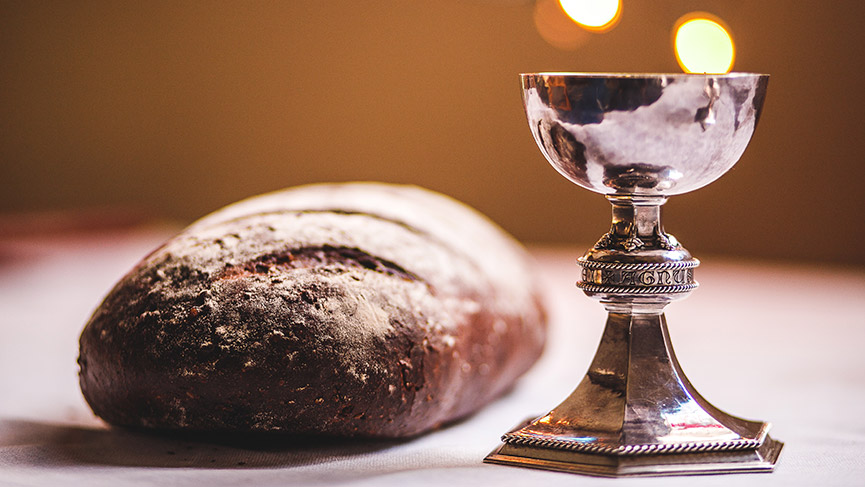A Spiritual Communion
The ancient tradition of the Church reminds us that when it is impossible to be present at a celebration of the Eucharist, and to receive Holy Communion, the desire to be united to Christ in the Sacrament is enough for God to grant all the spiritual benefits of Communion. What follows is a way for individuals, or small groups to open themselves up to the graces of Holy Communion and the blessing of God.
Blessed be the God of our salvation
Who bears our burdens and forgives our sins.
Most merciful God, I confess that I have sinned against you in thought, word, and deed, by what I have done, and by what I have left undone. I have not loved you with my whole heart; I have not loved my neighbors as myself. I am truly sorry and I humbly repent. For the sake of your Son Jesus Christ, have mercy on me and forgive me; that I may delight in your will, and walk in your ways, to the glory of your Name.
May Almighty God have mercy on me, forgive me all my sins through our Lord Jesus Christ, strengthen me in all goodness, and by the power of the Holy Spirit keep me in eternal life. Amen.
Lord, have mercy.
Christ, have mercy.
Lord, have mercy.
The Collect of the Day is then said, followed by the Readings appointed for the Sunday, or the day of the week. (http://www.lectionarypage.net/)
You may wish to read one of the Brothers’ sermons online (http://www.SSJE.org/goodnews).
The Apostles’ Creed or Nicene Creed may be recited. (http://bcponline.org/)
A time of intercession is kept. In your own words pray for your own needs, for those on your heart, the peace of the world, the welfare of the Church, the living and the departed, and especially any who are sick.
One of the forms of the Prayers of the People from the Book of Common Prayer may be used.
Then is said:
In union, Blessed Jesus, with the faithful gathered at every altar of your Church where your Blessed Body and Blood are offered this day, and remembering particularly my own church community, and the Brothers of the Society of Saint John the Evangelist, I long to offer you praise and thanksgiving, for creation and all the blessings of this life, for the redemption won for us by your life, death, and resurrection, for the means of grace and the hope of glory.
And particularly for the blessings given me ….
I believe that you are truly present in the Holy Sacrament, and since I cannot at this time receive communion, I pray you to come into my heart. I unite myself with you and embrace you with all my heart, my soul, and my mind. Let nothing separate me from you; let me serve you in this life until, by your grace, I come to your glorious kingdom and unending peace. Amen.
Our Father ….
Come Lord Jesus, and dwell in my heart in the fullness of your strength; be my wisdom and guide me in right pathways; conform my life and actions to the image of your holiness; and in the power of your gracious might, rule over every hostile power that threatens or disturbs the growth of your kingdom, who with the Father and the Holy Spirit, lives and reigns, one God, in glory everlasting. Amen.
The Anima Christi may be added:
Soul of Christ, sanctify me.
Body of Christ, save me;
Blood of Christ, inebriate me;
Water from the side of Christ, wash me;
Passion of Christ, strengthen me;
O good Jesu, hear me;
Within thy wounds hide me;
Suffer me not to be separated from thee;
From the malicious enemy defend me;
In the hour of death call me,
And bid me come to thee.
That with thy Saints I may praise thee
For ever and ever. Amen.
And may the peace of God, which passes all understanding, keep my heart and mind in the knowledge and love of God, and of his Son Jesus Christ my Lord; and the blessing of God Almighty, the Father, the Son and the Holy Spirit, be with me now and always. Amen.
This form of service has been adapted by James Koester SSJE from the Saint Augustine’s Prayer Book, revised editions 1967 and 2014, published by the Order of the Holy Cross, West Park, New York and Forward Movement; David Cobb and Derek Olsen, editors, and with additional material from the Book of Common Prayer, 1979.

Comments
Post a Comment